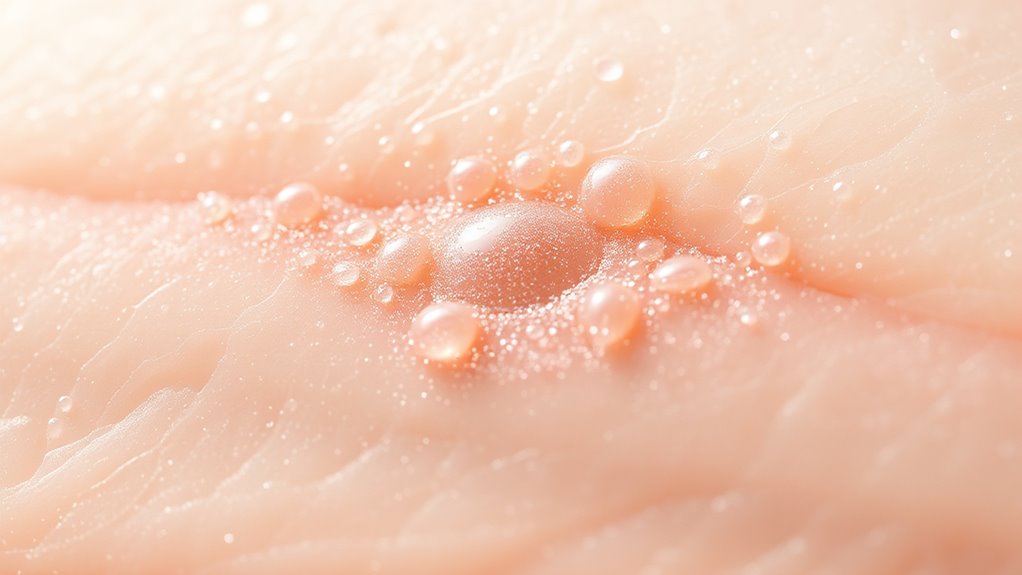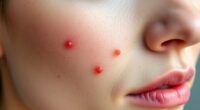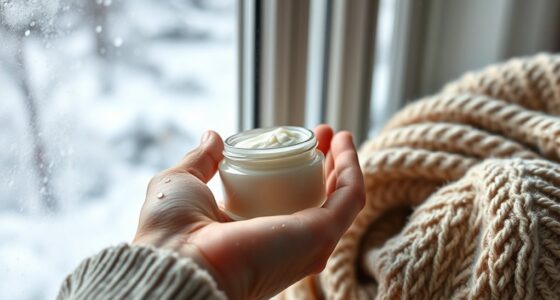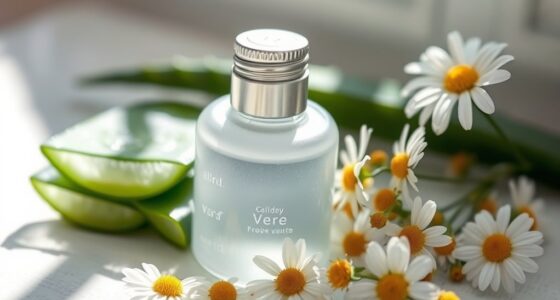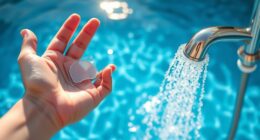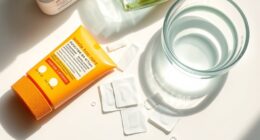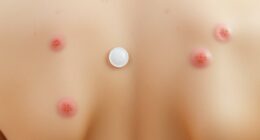Your skin’s most essential defense is its lipid layer, which many overlook. This barrier protects against irritants, locks in moisture, and keeps your skin resilient. To repair it, focus on using products with ceramides, fatty acids, and humectants like hyaluronic acid. Avoid harsh cleansers and over-exfoliating, which can damage this critical layer. Keeping this barrier healthy boosts your skin’s strength and appearance—if you want to learn how to rebuild it effectively, keep going.
Key Takeaways
- The skin’s lipid layer, composed of ceramides, fatty acids, and cholesterol, is essential for barrier repair and preventing moisture loss.
- Proper hydration with humectants like hyaluronic acid supports the lipid layer’s integrity and overall skin resilience.
- Using barrier-repair products containing ceramides and fatty acids helps rebuild and strengthen the compromised lipid matrix.
- Gentle cleansing avoids stripping natural lipids, preserving the skin’s protective barrier during the repair process.
- Consistent skincare routines and avoiding over-exfoliation are crucial for maintaining a healthy, resilient lipid layer.
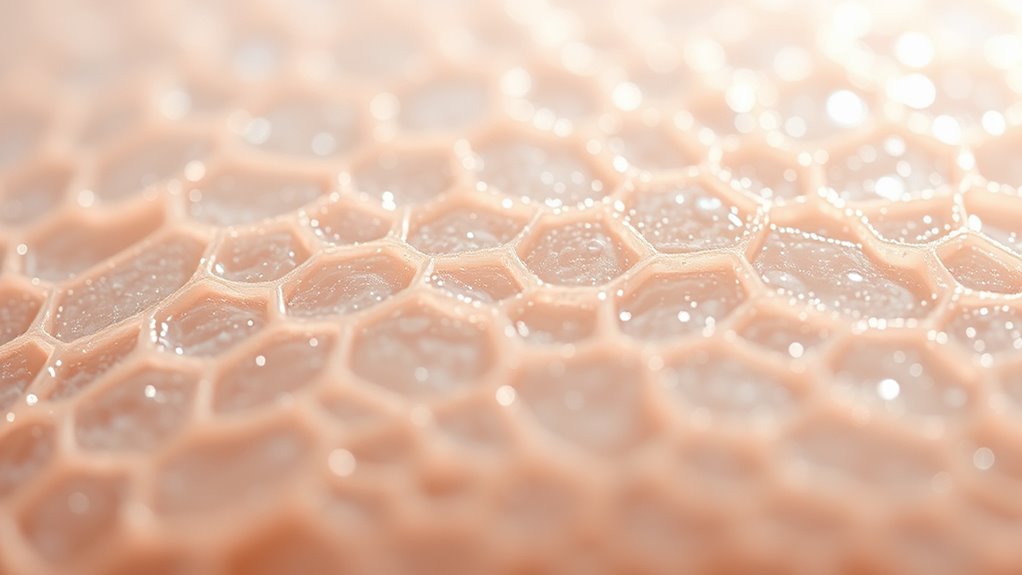
Your skin barrier is your first line of defense against environmental damage, irritants, and bacteria. When it’s compromised, you might notice increased sensitivity, dryness, or breakouts. Restoring it requires understanding the critical role of the lipid layer, the often-overlooked component that keeps moisture in and harmful elements out. This layer isn’t just a passive shield; it actively maintains skin health, but many overlook how essential hydration techniques and ingredient efficacy are in supporting it. Proper hydration isn’t just about drinking water; it involves using products that strengthen the skin’s ability to retain moisture. Incorporating humectants like hyaluronic acid or glycerin draws water into the skin, helping to bolster the lipid barrier from within. But hydration alone isn’t enough; you need ingredients that support the lipid layer’s integrity.
Ingredients like ceramides, fatty acids, and cholesterol are indispensable for rebuilding and reinforcing this lipid layer. When selecting skincare, look for formulations rich in these components, because their efficacy directly impacts your skin’s ability to repair itself. Using products with proven ingredient efficacy ensures you’re not wasting time or money on ingredients that don’t deliver results. For example, ceramide-rich formulations have been shown to restore barrier function, reduce transepidermal water loss, and improve overall skin resilience. When your skin’s lipid layer is healthy, it can better hold onto moisture, reducing dryness and irritation. This creates a cycle of improvement, where hydration techniques and targeted ingredients work synergistically to repair and protect.
Additionally, understanding the science of lipid layers can help you choose the most effective products to support your skin barrier. Consistency is key. Applying barrier-repair products regularly helps to restore the lipid matrix, but you also need to avoid harsh cleansers and irritants that strip away these essential lipids. Gentle cleansing and avoiding over-exfoliation preserve the integrity of your skin’s natural defenses. Remember, the goal isn’t just to soothe your skin temporarily but to rebuild a resilient barrier that withstands daily stressors. By focusing on both hydration techniques and ingredient efficacy, you’ll see your skin become more balanced, less sensitive, and better equipped to defend itself. Your skin isn’t just surface-deep; it’s a complex system that requires nurturing from within. Prioritize products that support the lipid layer, stay consistent in your routine, and your skin will thank you with improved health and strength.
Frequently Asked Questions
How Does Diet Influence Skin Lipid Layer Health?
Your diet plays a key role in maintaining your skin’s lipid layer. By ensuring a nutrition balance and increasing your fatty acid intake—especially omega-3 and omega-6—you support the health of your skin barrier. These healthy fats help reinforce the lipid layer, making your skin more resilient and less prone to dryness and irritation. Proper nutrition directly impacts your skin’s ability to stay hydrated and protected from environmental stressors.
Can Natural Remedies Strengthen the Skin’S Lipid Barrier?
Imagine you’re using herbal extracts like calendula or applying essential oils such as tea tree to boost your skin’s resilience. Natural remedies can strengthen your skin’s lipid barrier by providing essential fatty acids and antioxidants. For example, a person incorporating these into their routine saw improved skin hydration and reduced irritation. While evidence varies, herbal extracts and essential oils may support barrier health, but always patch-test and consult a dermatologist first.
What Role Do Environmental Factors Play in Lipid Layer Degradation?
Environmental factors profoundly impact your skin’s lipid layer. Pollution effects expose your skin to free radicals that break down lipids, weakening the barrier. Low humidity can dry out your skin, making the lipid layer more vulnerable to damage. Conversely, high humidity helps maintain hydration, supporting the lipid layer’s integrity. Protect your skin by minimizing pollution exposure and using moisturizers that bolster your skin’s natural defenses against these environmental stressors.
Are There Specific Skincare Ingredients That Target Lipid Barrier Repair?
When you’re looking to repair your lipid barrier, focus on ingredients that nourish and strengthen it. Ceramide boosters, essential fatty acids, and lipids work together to restore your skin’s natural defenses. These ingredients help replenish lost lipids, lock in moisture, and protect against environmental damage. By incorporating ceramide-rich products and essential fatty acids into your routine, you actively support your skin’s barrier, making it healthier, more resilient, and better equipped to face daily stressors.
How Does Age Affect the Lipid Layer’S Ability to Regenerate?
Aging effects can slow down your skin’s ability to regenerate its lipid layer. As you age, lipid decline becomes more prominent, making your barrier less effective at protecting and retaining moisture. This means you might notice drier, less resilient skin over time. To combat this, focus on nourishing ingredients that support lipid repair, like ceramides and fatty acids, which help restore your skin’s natural barrier and improve its resilience.
Conclusion
Don’t overlook the lipid layer—it’s your skin’s secret shield. While many focus on hydration or topical treatments, repairing this natural barrier is key to lasting improvements. You might think products alone can do the job, but without supporting your skin’s lipid layer, you’ll struggle to see real change. Prioritize nourishing and restoring this essential component, and you’ll notice healthier, more resilient skin. Trust me, a little attention here makes all the difference in your skincare routine.
